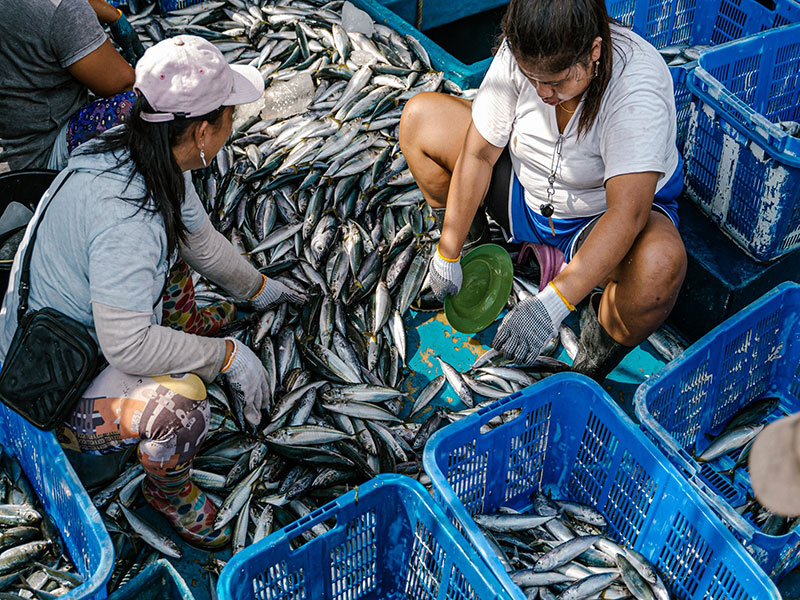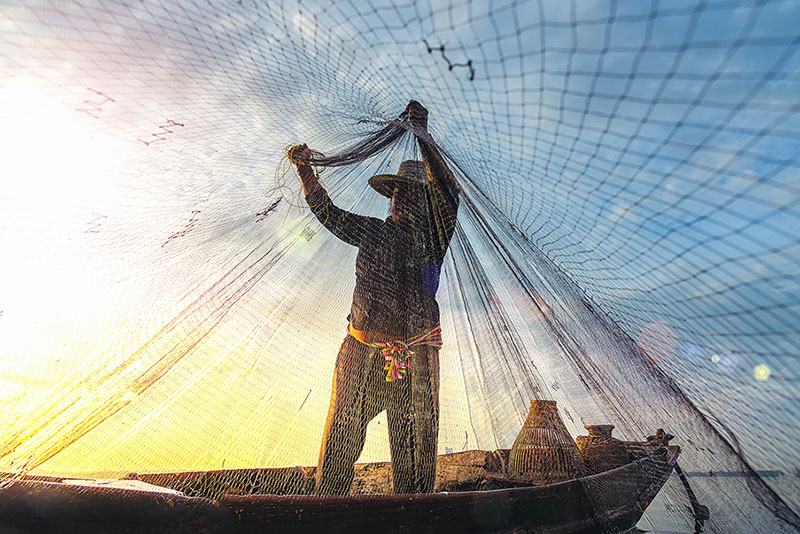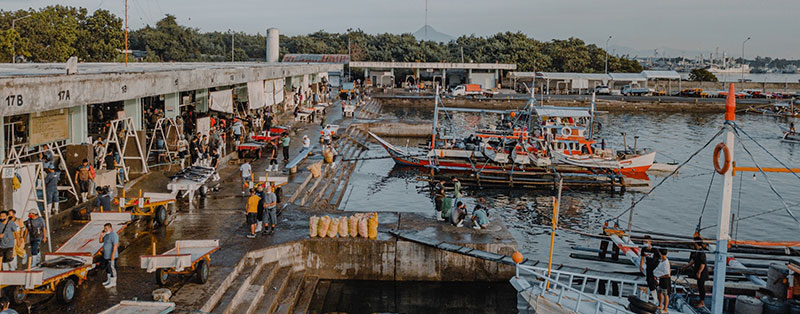The seafood industry includes global supply chains crucial for global food security and employment. It provides millions of jobs in fishing, transport, and processing, in both developed and emerging countries.
A growing body of evidence, including ILAB’s own reporting, documents forced labor and dangerous conditions onboard vessels and in seafood processing. Fishers, many of whom are migrant workers, describe misleading recruitment tactics and high recruitment fees, confiscated passports, long hours, withheld pay, unsafe living and working conditions, and being forced to work against their will, often under threat of violence.
These abuses are particularly prevalent where Illegal, Unreported, and Unregulated (IUU) Fishing occurs, as operators seek to increase profits by disregarding laws around conservation and vessel safety, or intentionally fish in areas where there are gaps in oversight and protections. Unfortunately, these abuses often go undisclosed and unaddressed due to a dispersed workforce, gaps in enforcement, inconsistent legal frameworks, isolation at sea, language barriers, and lack of collective worker voice.

The Solutions
Partnerships and Engagement
The Bureau of International Labor Affairs (ILAB) collaborates with U.S. interagency and international partners. We leverage our expertise in labor rights to contribute to joint initiatives such as the Interagency Maritime SAFE Act working group. We provide valuable support and resources on identifying labor abuses to interagency partners who regulate fishing on the high seas. We advise the Coast Guard on indicators of forced labor and help the National Oceanic and Atmospheric Administration to include crew labor standards in Regional Fisheries Management Organizations (RFMO). ILAB helps advance the fishing-related work of United Nations Agencies in the Joint Working Group on IUU Fishing. Additionally, ILAB works with U.S. trade partners to address fishing abuses in their waters.
Understanding the Problem: Researching the Fishing Supply Chain
Since abuse in the fishing sector often happens out of sight in distant waters, it is critical to understand the scope and nature of these violations. Through research into global seafood supply chains, ILAB has documented child labor and forced labor and associated abuses in fishing.
- ILAB’s List of Goods Produced by Child Labor or Forced Labor has documented child labor or forced labor in the production of seafood in 20 countries or areas: Bangladesh, Brazil, Burma, Cambodia, China, El Salvador, Ghana, Honduras, Indonesia, Kenya, Nicaragua, Paraguay, Peru, the Philippines, Taiwan, Tanzania, Thailand, Uganda, Vietnam, and Yemen.
- ILAB’s annual Findings on the Worst Forms of Child Labor report provides information on the global scope and nature of child labor, including in the seafood sector. These abuses are likely even more prevalent than current reporting suggests given the remote nature of this work and gaps in oversight and due diligence.
ILAB also provides tools and resources for advancing labor rights.
- The Responsible Business and Labor Rights InfoHub is a U.S. government-wide repository for businesses to advance responsible business conduct.
- ILAB’s worker voice research presents the key components for effective worker voice.

Programming and Policy
ILAB funds projects to address labor abuses in seafood supply chains. Our projects ensure governments and the private sector have the knowledge, tools, and capacity to enforce laws and promote ethical recruitment. We support the development of policies, programs, and systems that sustainably and holistically address labor violations, promote workers’ rights, and eliminate forced and child labor in the seafood supply chain.
- Research: As part of our Measurement, Awareness Raising and Policy Engagement (MAP16) project, the ILO conducted groundbreaking research to identify forced labor indicators in the distant water fishing industry and developed a handbook to help identify fishers at risk of labor abuse.
- Conditions: Our Addressing Labor Exploitation in Fishing in ASEAN (ALFA) project strengthens the capacity of the Association of Southeast Asian Nations (ASEAN) to address forced labor and abusive working conditions in the region.
- Recruitment: ILAB’s Fostering Accountability in Recruitment for Fishery Workers (FAIR Fish) project works with small and medium-sized seafood-processing companies and recruitment agencies in Thailand to develop and implement a responsible recruitment model.
- Artisanal Fishing: Our Decent Work in Fishing project improves working conditions in Ecuador and Peru in coastal communities engaged in artisanal fishing.
- Catching & Processing: Our Improving Workers’ Rights in the Rural Areas of Indo Pacific with a Focus on Women project works with local communities catching and processing seafood.
Enforcement Tools
A key element to addressing labor abuse in fishing is holding country governments and the private sector accountable. ILAB works with its partners to advance workers’ rights in fishing through the leverage of enforcement mechanisms, such as U.S. free trade agreements and unilateral preference programs. These require country partners to adhere to labor rights criteria in law and practice to benefit from U.S. market access. ILAB played a key role in developing the first Global Magnitsky sanctions in December 2022 for labor abuse in the fishing sector. ILAB also shares research and data with U.S. Customs and Border Protection as a resource to keep goods made with forced labor out of the United States. For the first time in 2023, NOAA identified China and Taiwan for IUU fishing violations and associated forced labor issues using ILAB research and evidence, which now results in a certification process that can include port denials and other enforcement.

